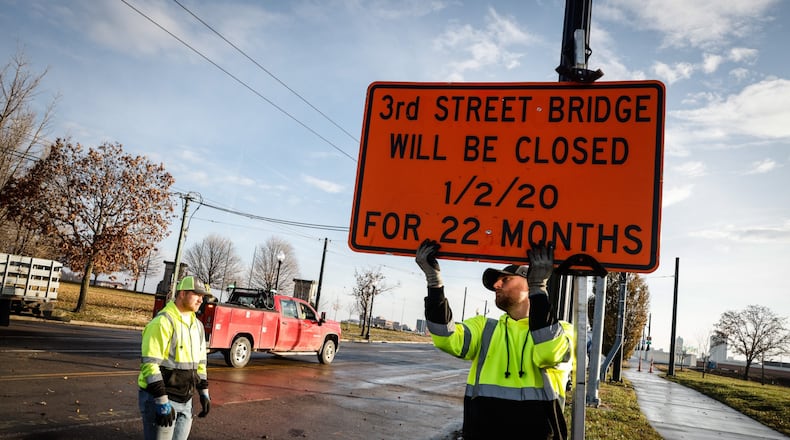Gruner said this was a special project because the bridge is a connector between downtown and west Dayton that has plenty of history.
“This is huge,” he said. “We’ve been working on this project since 2012.”
Credit: JIM NOELKER
Credit: JIM NOELKER
Crews removed the orange barrels and striped road barricades on either end of the bridge shortly after 9 a.m. Thursday. Within minutes, pedestrians, bicyclists and vehicles began using the structure to get from downtown to west Dayton and vice versa.
Jeffrey Vinson, 60, who lives near the Dayton VA Medical Center, was the first pedestrian to walk across the new bridge.
Vinson, who visits downtown a few times each week, said he’s very relieved the bridge has reopened because the West Fifth Street bridge detour added 10 to 15 minutes to his walks.
“It was really inconvenient,” he said. “They did a good job, though it took them a while.”
The Third Street bridge has been one of the county’s most highly traveled bridges, typically handling about 20,000 vehicles each day, said Gruner.
The 720-foot bridge spans the Great Miami River, which historically has been viewed as a divider, separating West Dayton from the rest of the city.
Dayton, as many people have noted, remains a very segregated city.
But for years, a variety of events have been held on the bridge to try to bring people of all backgrounds together and unify the community, including the Longest Table dinner party and the the annual Martin Luther King Day march.
The Third Street bridge, also known as the Peace bridge, was 114 years old and deteriorating, and chunks of concrete kept breaking off, falling onto the riverbank and bike path below.
Officials say the new bridge obviously remedies the safety issues, but it also features works of public art, including sculptures of the Wright Brothers and Paul Laurence Dunbar and the original 1963 Peace March.
The bridge also has ornate observation platforms, and its sidewalks contain African Adinkra symbols.
Artists Steven Weitzman and Bing Davis helped design the artistic elements, and they hope the bridge will be a must-see attraction and destination.
“This is a dream come true,” said Davis, whose art studio is located along West Third Street in the Wright Dunbar business district.
Davis said he African symbols and other artwork have a positive message and honor Dayton’s rich history.
“Of all the bridges in Dayton, it may be the most historical and the most significant,” he said. “We are a city that has made an effort and still makes an effort to try to come together as a unifying force.”
The new structure has five lanes ― one more than the old structure— as well as wider sidewalks and a shared-use path.
“The design turned out great, with lots of input from the public and people around town,” said Gruner, whose office is for responsible about 525 bridges.
Davis also said the Third Street bridge is the most convenient way to travel between downtown and Wright Dunbar historic district and West Dayton.
“It’s a gigantic relief,” he said. “And what we have ... is unique and special.”
About the Author



